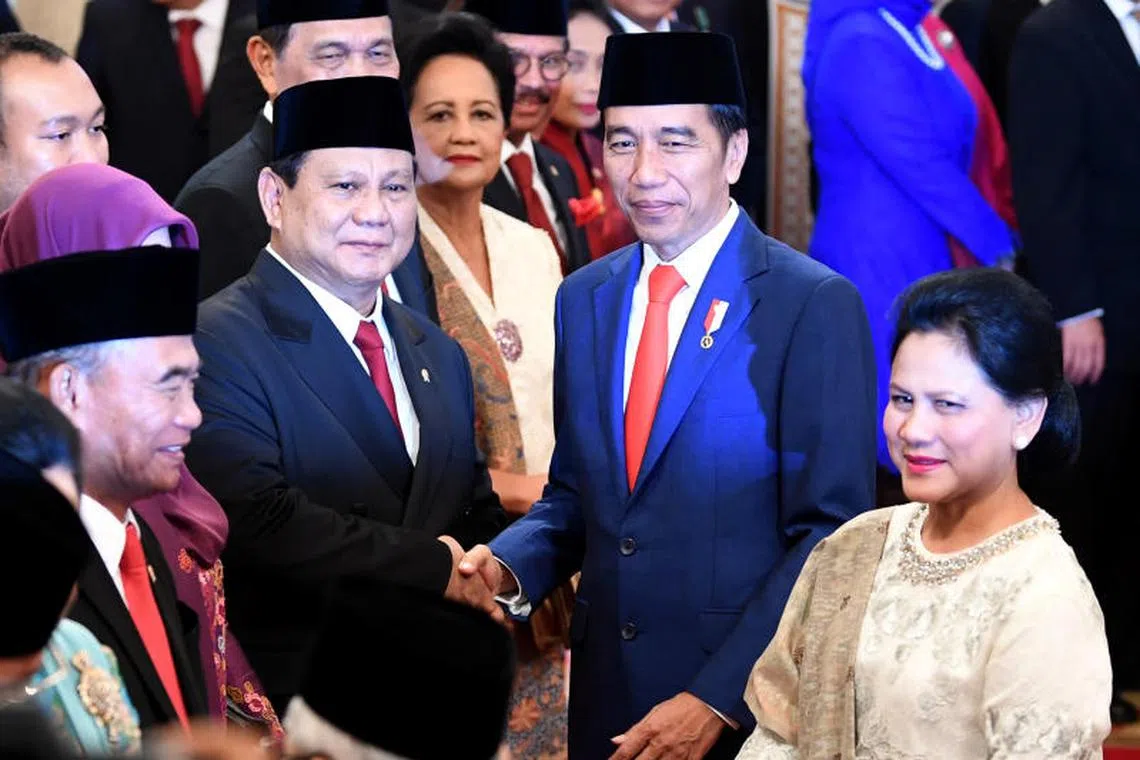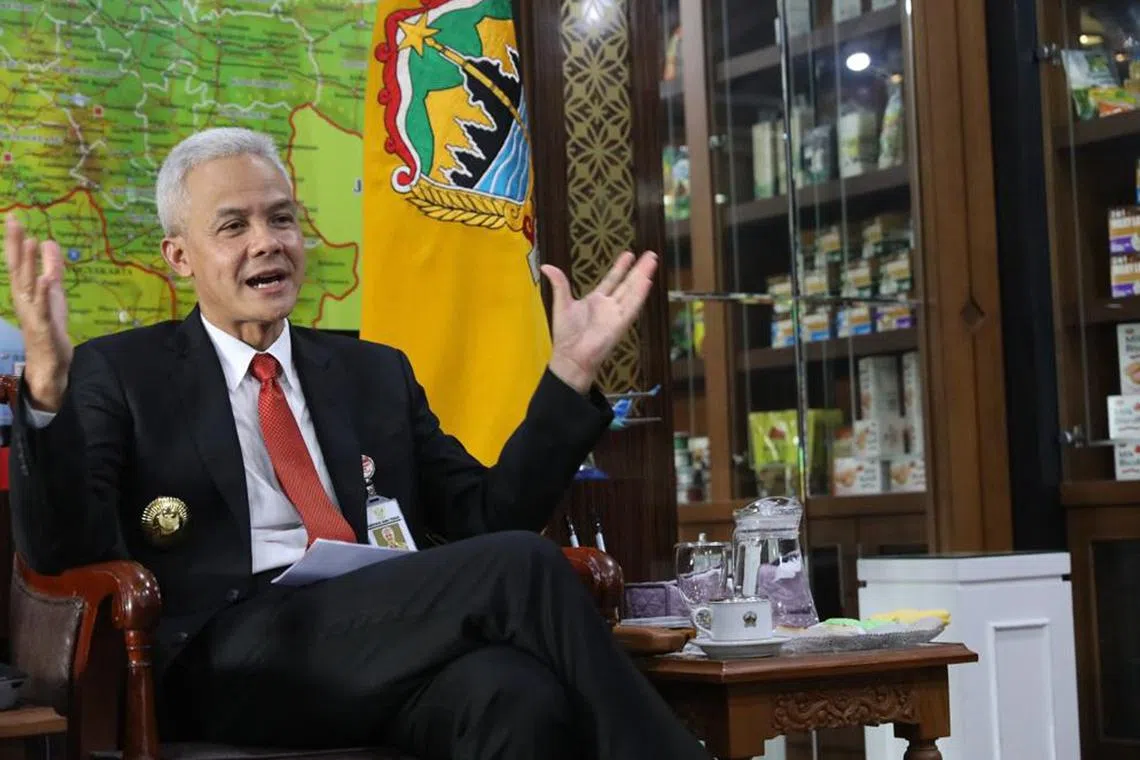Round 2 in the battle of ‘political heirs’ and ‘newcomers’ for Indonesia’s presidency
Joko Widodo was a disruptor when he became president eight years ago. The 2024 election will see a return of the clash between new members of the two camps.
Sign up now: Get ST's newsletters delivered to your inbox

Mr Prabowo Subianto (far left) being congratulated by President Joko Widodo on becoming defence minister in 2019.
PHOTO: REUTERS
Johannes Nugroho
Follow topic:
As Indonesia approaches its fifth direct presidential election in 2024,
This breed of newcomer politicians is a phenomenon not even a decade old. It started when President Joko Widodo won in 2014 against Mr Prabowo Subianto. Mr Widodo had risen from humble beginnings – his family had no record of public service – whereas Mr Subianto, a retired army general, was formerly married to a daughter of the late president Suharto as well as being the son of Mr Sumitro Djojohadikusumo, a prominent economist who served as a minister during Mr Suharto’s tenure as well as that of his predecessor Sukarno, Indonesia’s first president.
Eight years on from when Mr Widodo first prevailed, the battle between the “political heirs” and the newcomers continues, with more contenders than ever before.
In the former camp, there are Speaker of the House of Representatives (DPR) Puan Maharani, the daughter of former president Megawati Sukarnoputri
Among the political newcomers are Mr Anies Baswedan
There is no doubt that only a few will eventually go on to contest in 2024. Indonesian electoral regulations require a presidential nominee to have the support of political parties with at least 20 per cent of the number of seats in the DPR or 25 per cent of the total votes cast in the last legislative election.
A public poll conducted in early October by Saiful Mujani Research and Consulting for three candidates ranked Mr Pranowo at the top with 32.1 per cent, followed by Mr Subianto at 27.5 per cent and Mr Baswedan at 26 per cent. But when the simulation included only Mr Subianto, Ms Maharani and Mr Hartarto, the result was 54.9 per cent, 10.6 per cent and 8.8 per cent, respectively.
Another poll with multiple candidates, carried out by IndoStrategi Research and Consulting in late October, found Mr Subianto in the lead with 31.9 per cent, followed by Mr Pranowo at 20.3 per cent, Mr Baswedan at 13.2 per cent, Mr Kamil at 6.6 per cent, Ms Parawansa at 3.9 per cent, Mr Agus at 3.1 per cent, Ms Maharani at 2.7 per cent, Mr Hartarto at 2.4 per cent and Mr Iskandar at 2.2 per cent.
As with the 2019 election, public polling will play a significant role in determining party coalitions because of the rule change which led to legislative and presidential elections taking place simultaneously. By contrast, in 2014, the legislative election was carried out ahead of the presidential one, making it possible for political parties to form coalitions based on published election results.
Apprenticeships for new leaders
So how has Indonesia successfully bred a host of political newcomers? The answer lies in the institution of direct one-man-one-vote elections for mayoral and gubernatorial offices in 2005. Mr Widodo, for instance, made his first foray into local politics by winning Surakarta’s mayoral election in 2005 before going on to become governor of Jakarta in 2012.
Popularly elected regional executives, wielding wide-ranging powers granted by regional autonomy, are usually able to make their mark in politics by developing their own brand of policy and leadership styles. In many ways, regional posts have become apprenticeships for these new leaders to make the leap into national politics. They also serve as platforms from which they can promote themselves with voters.
Mr Pranowo started out as a member of the DPR for Indonesian Democratic Party of Struggle (PDI-P) in 2004, but did not become widely known to the public until he won the Central Java gubernatorial election in 2013 and was re-elected five years later. Modelling himself on Mr Widodo, Mr Pranowo is seen as a “man of the people”.
Mr Baswedan was born into a family with a history of public service. His grandfather Abdurrahman Baswedan was a diplomat and briefly deputy minister of information between 1946 and 1947.
Mr Baswedan had to work his way up the political ladder. He entered politics when he joined Partai Demokrat’s Presidential Convention in 2013, but failed to secure the nomination. He then served for two years as Mr Widodo’s minister of education between 2014 and 2016 before being let go in a Cabinet reshuffle. In the same year, he made a political comeback by contesting the governorship of Jakarta against Mr Basuki Tjahaja Purnama, better known as Ahok, in one of Indonesia’s most racially charged elections. Mr Baswedan won decisively by riding on the Muslim vote.
The 53-year-old politician was also the first presidential hopeful to throw his hat in the ring when the NasDem party on Oct 3 endorsed him as its preferred candidate. Since NasDem commands only 10.26 per cent of the seats in the DPR, it will need other parties to back its choice to meet the 20 per cent minimum requirement. It has reportedly been involved in intensive talks for a possible coalition with both the Prosperous Justice Party (8.7 per cent of seats) and Partai Demokrat (9.39 per cent of seats), though it claims it is open to other parties as well.
Tensions in PDI-P
The largest party in Parliament, PDI-P, founded and chaired by former president Megawati, has yet to declare its presidential candidate. As the party controls 22.26 per cent of DPR seats, it can technically go it alone, but will likely work with other parties to maximise the chances of its ticket.
Nowhere is the tension between the newcomers and political elite more palpable than in the jostling within PDI-P.
Various public polls suggest that Mr Pranowo, a card-carrying member of PDI-P, is the most popular candidate within the party. Yet, PDI-P has so far withheld endorsement for him and has on several occasions warned him or other party hopefuls against “making political manoeuvres”.

Various public polls suggest that Mr Ganjar Pranowo, a card-carrying member of PDI-P, is the most popular candidate within the party.
PHOTO: GOVERNOR’S OFFICE
PDI-P bigwigs, including chairman Megawati, are seemingly bent on seeing Ms Maharani, the heir apparent to the Sukarno dynasty, anointed as the party’s presidential candidate. But party insiders believe that Mr Pranowo will probably be duly endorsed by the PDI-P, and is now being “hazed” to ensure his loyalty.
While being a party of the Sukarno clan, PDI-P has been known to put pragmatism above dynastic aspirations. In 2014, it nominated newcomer cadre Joko Widodo after polls showed him to be more popular with voters than its leader, Ms Megawati. But Indonesia’s political elite has never quite accepted the newcomers, seeing them as disruptors to their political dominance. So it is unsurprising that they have now hatched a plan to dismantle the structure that has nurtured the newcomers.
Earlier this month, members of the ruling coalition floated the idea of bringing back Suharto-era indirect gubernatorial elections, whereby provincial governors will be elected by the national government with parliamentary approval. Headed by Speaker of the People’s Consultative Assembly Bambang Soesatyo, the old guard grouping argued that the change was necessary to “minimise endemic corruption”.
The fate of direct gubernatorial elections will depend on who becomes the next president. A president coming from an elite background is more likely to support their discontinuation.
For now, both the elite and newcomers have their eyes fixed on 2024. There may even be surprises in store as supporters of a “dream” Subianto-Widodo ticket have filed a judicial review with the Constitutional Court to allow Mr Widodo to run as vice-presidential candidate to Mr Subianto, his arch-rival in 2014 and 2019. Mr Widodo, a two-term president, is constitutionally barred from running again for the top job.
Johannes Nugroho is a journalist and political analyst from Surabaya, Indonesia.

